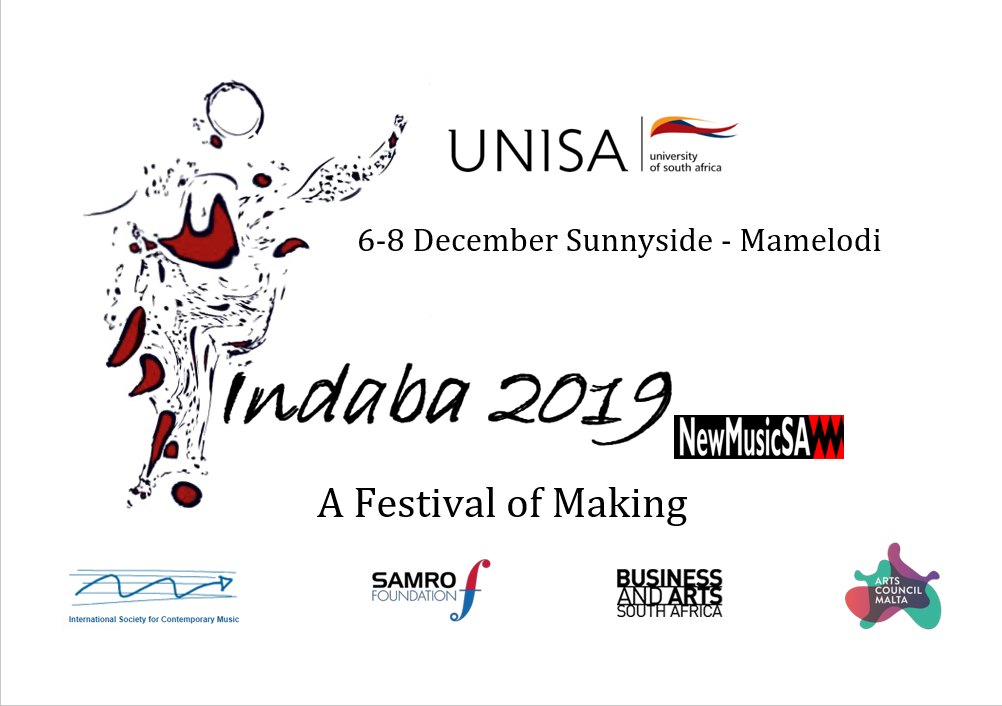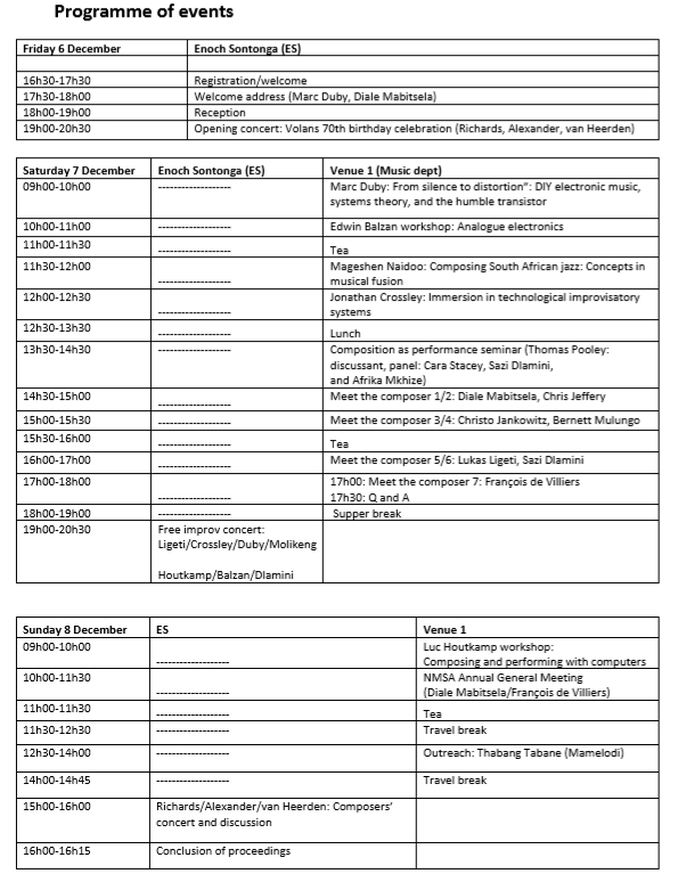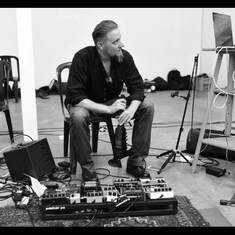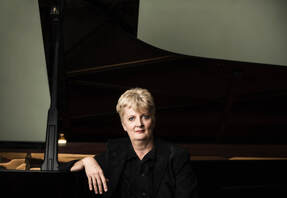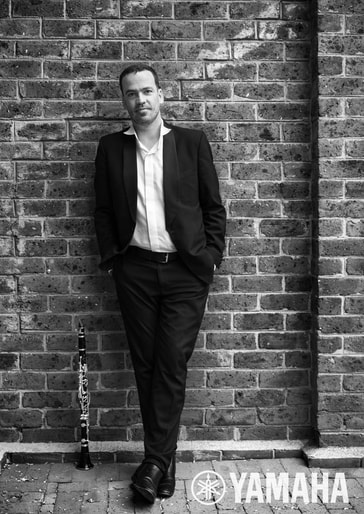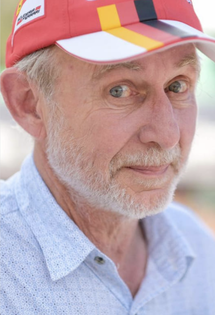
NMSA Indaba 2019
Welcome to the 2019 NewMusicSA Indaba. In my capacity as guest curator, I’d like to dedicate the proceedings for this NMSA Indaba to the memory of Professor Jürgen Bräuninger (1956-2019).
By his kind permission, here follow extracts from Professor Christopher Ballantine’s personal tribute to him:
Jürgen and I were close colleagues in the School of Music for three decades. The first thing to say, is what an enormous privilege that was. It means that we met almost every day. And so every day brought the promise not just of interesting, collegial discussion, but also of laughter. Jürgen’s sense of humour was the stuff of legend: impish, irreverent, original, mischievous, sometimes wicked, and always waiting to ignite. We spoke endlessly about his (and my) other passions: politics; his sense of outrage about the injustices of the world; and music. It was of course music that had brought us together, initially as university colleagues.
And what an extraordinary colleague Jürgen was. His remarkably original, creative intelligence had a way of slicing through problems, devising solutions, always seeking the fairest and most democratic outcomes. Jürgen’s extraordinary creative intelligence was also what he offered his students. And it had a profound effect on them. In the last few days, messages have poured in from former students and colleagues in many parts of the world, all of them paying high tribute to how Jürgen had changed their lives. Let me read just a small handful of very typical examples:
- Prof. Marc Duby
Welcome to the 2019 NewMusicSA Indaba. In my capacity as guest curator, I’d like to dedicate the proceedings for this NMSA Indaba to the memory of Professor Jürgen Bräuninger (1956-2019).
By his kind permission, here follow extracts from Professor Christopher Ballantine’s personal tribute to him:
Jürgen and I were close colleagues in the School of Music for three decades. The first thing to say, is what an enormous privilege that was. It means that we met almost every day. And so every day brought the promise not just of interesting, collegial discussion, but also of laughter. Jürgen’s sense of humour was the stuff of legend: impish, irreverent, original, mischievous, sometimes wicked, and always waiting to ignite. We spoke endlessly about his (and my) other passions: politics; his sense of outrage about the injustices of the world; and music. It was of course music that had brought us together, initially as university colleagues.
And what an extraordinary colleague Jürgen was. His remarkably original, creative intelligence had a way of slicing through problems, devising solutions, always seeking the fairest and most democratic outcomes. Jürgen’s extraordinary creative intelligence was also what he offered his students. And it had a profound effect on them. In the last few days, messages have poured in from former students and colleagues in many parts of the world, all of them paying high tribute to how Jürgen had changed their lives. Let me read just a small handful of very typical examples:
- As students at UKZN, Jürgen triggered in some of us a way of thinking differently about sound as we create music. Some of his ideas we could not really grasp until we had left the University.
- Jürgen transformed my thinking around the creative power of sound.
- He was an astounding composer and a most impeccable person. Our universe is far dimmer.
- Absolutely heartbroken. Jürgen was such a significant role model and influence for so many young musicians.
- The coolest of guys. This world is worse off without him.
- An inspiring, kind man with incredible integrity, who shared his knowledge with grace and joy.
- This man introduced me to film music. This man introduced me to Brian Eno and Ligeti. This man introduced me to multi-ethnicity in music. And this man introduced me to my future.
- Goodbye my friend and mentor. Words cannot describe the extent of the impact you had on my life.
- Prof. Marc Duby
Kevin Volans 70th birthday celebration concert (Friday 6 December)
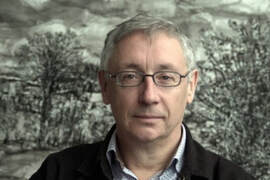
Kevin Volans was born in Pietermaritzburg, South Africa in 1949, and studied at the University of the Witwatersrand and later with Karlheinz Stockhausen and Mauricio Kagel in Cologne. He moved to Ireland in 1986 and has been an Irish citizen since 1994. He lives in Co. Cork. After a productive collaboration with the Kronos quartet in the 1980s his work, principally in the field of chamber and orchestral music, has been regularly performed worldwide. The Kronos discs, White Man Sleeps and Pieces of Africa broke all records for string quartet disc sales.
In the last 35 years Kevin Volans has worked with the following quartets: Kronos, Smith Quartet, Duke Quartet, Arditti Quartet, pianists: Barry Douglas, Marc-André Hamelin, Peter Donohoe, Jill Richards, conductors: Michael Tilson Thomas, Marek Janowski, Alan Buribayev, Yan Pascal Tortelier, orchestras: the San Francisco Symphony, BBC Symphony, Bayerische Rundfunk Symphonieorchester, Royal Flemish Philharmonic, BBC Singers, percussionists: Robyn Schulkowsky, Jonny Axelsson, SISU and
many others, as well as dance companies like Siobhan Davies, Shobana Jeyasingh, White Oak, Jonathan Burrows and artists: William Kentridge, Juergen Partenheimer, Jose-Manuel Ballester.
Principal performances in the last years include the Berliner Musikfest, Vienna State Opera, the Salzburger Festspiele, the Lincoln Center NY, Dokumenta Kassel, the Pompidou Centre Paris, Concertgebouw Amsterdam, Kunstmuseum Bonn, the Chicago Institute of Fine Arts, the Edinburgh Festival, the Barbican, South Bank, Wigmore Hall, London and several times in the BBC Proms.
In 1997 the BBC Music Magazine listed him as one of the 50 most important living composers and he was described by the Village Voice (New York) as “one of the most original and unpredictable voices on the planet”. In 1999 the South Bank in London hosted a 50th birthday celebration of his work and for his 60th the Wigmore Hall in London organised a “Kevin Volans Day” of concerts. Subsequent to this latter event he was given the Royal Philharmonic Society Music Award for the best chamber work performed in Britain in 2009. He has been the featured composer in several European festivals of contemporary music and he was the featured composer in Prague in November 2017. 2017 saw 9 world premieres of his work. He has taught many of Ireland’s distinguished young composers and a number of others, as well as several international, award-winning composers outside Ireland. There are some 47 CDs and videos featuring his music currently available. His work is performed regularly worldwide.
Programme:
clarinet:violin:piano with CPE (world première)
violin:piano (dedicated to Waldo Alexander)
Double Take
Visiting artists
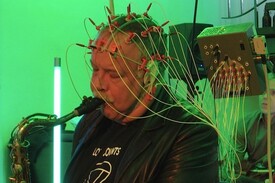
Luc Houtkamp (saxophone, electronics)
Luc Houtkamp is a composer who bridges the gap between different worlds of music. Having a background in jazz & improvised music as a saxophone player, his musical goal is to establish a continuum between improvisation and composition in which the difference between the two dissolves.
With the aid of computers and live electronics as well as various forms of music notation his compositions are highly personal in both sound and concept. Stylistic freedom is not a post-modern cliché, but based on his belief that musical style is secondary in importance and they’re to serve the expressive quality of the music itself.
His main interest in his pieces is the way in which the musicians play together, and how this can be directed by means of composition and the use of computers.
After a long-standing career as an improvising musician, Houtkamp established his own POW Ensemble in 2001. Being a flexible unit of musicians with musical backgrounds in jazz, rock, electronic and contemporary music, it soon became the ideal body for the performance of his own compositions.
Over the years, writing compositions became an important part of his musical output. Besides pieces for the POW Ensemble, he started composing for numerous other ensembles and musicians.
Luc Houtkamp currently lives and works in Malta. Photo Ó Joker Nies
Edwin Balzan (electronics)
Luc Houtkamp is a composer who bridges the gap between different worlds of music. Having a background in jazz & improvised music as a saxophone player, his musical goal is to establish a continuum between improvisation and composition in which the difference between the two dissolves.
With the aid of computers and live electronics as well as various forms of music notation his compositions are highly personal in both sound and concept. Stylistic freedom is not a post-modern cliché, but based on his belief that musical style is secondary in importance and they’re to serve the expressive quality of the music itself.
His main interest in his pieces is the way in which the musicians play together, and how this can be directed by means of composition and the use of computers.
After a long-standing career as an improvising musician, Houtkamp established his own POW Ensemble in 2001. Being a flexible unit of musicians with musical backgrounds in jazz, rock, electronic and contemporary music, it soon became the ideal body for the performance of his own compositions.
Over the years, writing compositions became an important part of his musical output. Besides pieces for the POW Ensemble, he started composing for numerous other ensembles and musicians.
Luc Houtkamp currently lives and works in Malta. Photo Ó Joker Nies
Edwin Balzan (electronics)
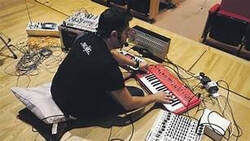
Edwin Balzan is one of Malta’s electronic music pioneers having been involved in the electronic music scene for the past 30 years. Edwin was one of the first musicians and producers to embrace dance music in Malta.
Since 1998 he has collaborated with DJ Owen Jay co-producing music for the very first techno album released in Malta and has also founded the techno project Duo Blank with fellow musician and long-time friend Frank Cachia with which he released over 7 international dance music singles and co-produced 3 albums.
Most recently he produces music entirely on modular synthesizers. In fact, his most recent project is a duo with Owen Jay named ‘Parallaks’ which was born out of the curiosity and need to produce and perform entirely on this type of synthesizer. The duo have launched their first release on vinyl on the label Moto Music in 2018, the year in which they also performed their first live acts exclusively on Eurorack modular synthesizers.
Since 2015, Edwin was also active in the collective artist scene in Malta founding the first electronic music-related NGO named ‘Electronic Music Malta’. He regularly gives talks and demonstrations on music production and modular synthesis.
Since 1998 he has collaborated with DJ Owen Jay co-producing music for the very first techno album released in Malta and has also founded the techno project Duo Blank with fellow musician and long-time friend Frank Cachia with which he released over 7 international dance music singles and co-produced 3 albums.
Most recently he produces music entirely on modular synthesizers. In fact, his most recent project is a duo with Owen Jay named ‘Parallaks’ which was born out of the curiosity and need to produce and perform entirely on this type of synthesizer. The duo have launched their first release on vinyl on the label Moto Music in 2018, the year in which they also performed their first live acts exclusively on Eurorack modular synthesizers.
Since 2015, Edwin was also active in the collective artist scene in Malta founding the first electronic music-related NGO named ‘Electronic Music Malta’. He regularly gives talks and demonstrations on music production and modular synthesis.
Composers’ concert (Sunday 3 pm)
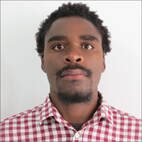
- Bernett Mulungo: Gazankulu Suite, nos. 2, 3 and 4 (trio)
This composition was inspired by compositional questions I had (and still have) after teaching the module African Composition at the university. I will not list the questions. However, in the composition, I try to interrogate (for myself) what is at the essence of African music in the modern compositional space. And rhythm still came to the forefront. Hence, the composition is mostly rhythmically driven. The rhythmic design is influenced by some rhythms that are located with music of the Tsonga people in the Limpopo Province (in the formerly Gazankulu region. Hence, the title. This is not, in any way, a direct translation or transferal of Tsonga music into my composition. This work is made of five different parts. The movements to be performed are entitled as follows:
Vahloti (Hunters)
Ntlango waxi Gaza (A Children’s Game from Gazankulu)
Ndzhuti (A Shade)
Bernett Nkwayi Mulungo, graduated with both Bachelor of Music and Master of Music degree(s) from the University of the Witwatersrand, where he majored in composition and research on music composition in South African theatre. As a composer (and performer), he has collaborated with theatre practitioners in productions that have been performed at the National Art Festival (Makhanda), the Market Theatre (Johannesburg), the State Theatre (Pretoria), to name a few. At present, he has a position at UNISA, in the Department of Art and Music, as a lecturer in Music Theory and Composition.

- Amy Crankshaw: Helicoid, Prism - from Four Figures (piano solo)
Prism: A solid geometric figure whose two ends are similar, equal, and parallel rectilinear figures, and whose sides are parallelograms.
Helicoid: A helical or spiral object, like a spiral staircase.
Amy Crankshaw (b.1991) is a South African composer, pianist and French horn player born in Port Elizabeth and based in London (UK). She is currently studying the MA in Opera Making and Writing at the Guildhall School of Music and Drama. Amy is grateful to the Boltini Trust, whose generous support has made it possible for her to study at the Guildhall School.
Amy was composer-in-residence with the London City Orchestra in their 2016 summer term. For the 2017 Crouch End Festival, she curated and produced IMMERSION, her own music event that combined a selection of her new chamber music with contemporary artworks, carefully crafted food, and immersive audience experiences. Amy is currently engaged with XOGA to write music for their new chamber opera, The Irish Astrologer, to be premiered in 2020.
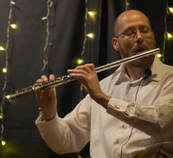
- Douglas Scott: Umvumo Wekati (violin solo)
Umvumo Wekati (the song of the cat), is a short character piece for solo violin dedicated to my daughter, Caelyn. It is based on a little theme we created together when she was very young on a keyboard that made "meows" for every note.
Douglas Scott is a composer, flautist, teacher and music researcher. His compositions take a meta-modernist approach that addresses far-reaching questions without taking themselves to seriously. He holds a MMus (flute performance) at UNISA and an MBA from Edinburgh Business School and is currently a PhD candidate (cognitive music information retrieval) at the University of the Free State. He currently serves as chairman of NewMusicSA.
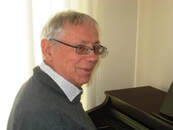
- Malcolm Dedman: Pas de Deux (violin, clarinet)
Written in 2012, ‘Pas de Deux’ is a duet for violin and clarinet and lasts just under 5 minutes.
The title suggests a dance for two ballet dancers, but in this piece, I envisage that the dance is for the two musical instruments themselves. Its main theme is a fast melody with the two instruments very much entwined with one another. This is contrasted with two episodes of a slow adagio. When the fast music re-appears at the end, it quickens to a lively and exhilarating close.
Malcolm Dedman was born in London, England, on 3 November 1948. Fascinated at an early age by his mother’s piano playing, she taught him to play when he was around 5 years of age. More recently, Malcolm has received performances in England, Ireland, France, Bulgaria, Italy, Macedonia, Slovakia, USA, Brazil, Mexico, Japan, South Korea, New Zealand and South Africa. Many of these performances have been received well by audiences and critics, including two excellent reviews by Anthony Payne.
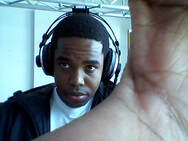
- Diale Mabitsela: (In-Isolation) - Anthony of Padua (Piano)
“Anthony of Padua” is a piece for four keyboards (2 acoustic pianos, one Epiano and an organ) in 2 parts. It explores the incorporation of contemplative silence within a piece of music and can thus be thought of a period of silent contemplation punctuated by incidents or ‘statements’ of music. Listening can take two approaches: the audible music plays a functional role, preparing and conditioning the listener to dwell within the silence; The silence provides time in which to consider at length and soak in the musical material.
‘In isolation’ is a particular performance scenario of AoP.
The question of silence in a piece of music is explored in new ways: The silence of the music that, for the audience, may have been; and for the performer (and others that know the original well), that ‘should’ve’ been.
Diale Daniel Mabitsela began his music studies at the University of the Witwatersrand, Johannesburg, where he developed an interest in various musical idioms including jazz, twentieth century minimalism and various electronic musics. He majored in Composition in his 4th year and excelled in his class. His hard work and dedication to his craft earned him the Kirby Medal and Mary Rorich Prize for best final year music student. He has completed master’s degree in music dealing with the relationship between sound design and music in film and has recently completed second master’s degree in music composition at The University of Oxford.
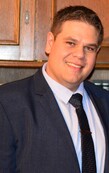
- Jaco Meyer: Mirror (violin solo)
Mirror IV is a march-like piece where the one half of notes are based on the other half of notes: I used a conceptual symmetrical 'mirror' line that exists in the middle of the four strings of the cello. Thus, the notes played and depressed on strings I and II will directly reflect on strings III and IV as if it is played in mirror (for example a C open string will be followed by A open string, and C# on string IV will reflect as A# on string I). This conceptual mirror gave me the opportunity to generate new material directly from existing material in the piece. This is one of many pieces in which I explored different types of conceptual mirrors.
Jaco Meyer is a composer and researcher who graduated with a PhD in musicology from the North-West University and an LTCL in Composition from the Trinity College of London. As composer he received many commissions and his music has been performed by international musicians, ensembles and orchestras. In 2019 the saxophone and cello duo, the Thomas-Helton Duo from America, toured South Africa and performed his composition A Wind-Up Doll's Dream and this work was also recorded for their next album that will be released in 2020. Currently, he is working on a project for which he will compose music for sculptures by Willem Boshoff in the MTN Foundation Art Collection. His research on music analysis, music theory and perception in music has been presented at various international conferences and published in peer-reviewed journals.
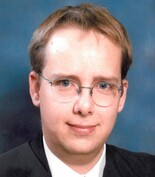
- Christo Jankowitz: 5 Abstractions, nos. 1 and 2 (trio)
The combination of instruments used in this work offer considerable possibilities to the imagination of a composer. In writing this work I intended to explore two parameters of composition that I have not previously attempted.
The first involves the concept of abstraction (reflected in the work’s title). I took this as denoting a use of composition techniques which are not particularly motivated by considerations that reveal themselves as definably mimetic or naturalistic. As these factors cannot be completely expunged from the creative act, an element of irony reveals itself in some of the titles of the individual movements.
The second parameter focusses on an exploration of the possibilities of micro-form. The work comprises five compact movements with two being placed on either side of the third piece which occupies the longest time-span. This movement is however, not intended to be singled out as a particular object of focus as the material developed organically into this time-span. After the third piece had been completed I found a subtle technical shift to come about in the last two pieces of the set.
The movements to be performed are entitled as follows:
1. Lament for Alban’s Cigar
2. Fierce Circularities
Christo Jankowitz holds a Doctor of Music in musical composition conferred by the University of the Witwatersrand. He was awarded prizes twice at the SAMRO Overseas Scholarship Competition for Composers, and also received the main MTN CIT:Y Bursary Prize for Music and the first prize in the Sowetan-SAMRO Massed Choir Festival Composition Competition. As an OMT funded scholar he attended performances of his music at the Atlantic Music Festival in Maine in 2012. After this Christo worked as a postdoctoral research fellow in Music Composition at the University of Cape Town where he also lectured in Music Theory and Analysis, Composition and Orchestration. He joined Unisa’s Department of Art and Music as a Senior Lecturer in June 2018.
Artists in residence: Richards/Alexander/van Heerden trio
Jill Richards (piano)
Jill Richards is a South African pianist specialising in new music. Versatile and dynamic, her interests range from the repertoire of 19th century to the 21st, to free improvisation. Her career includes collaborations with numerous composers from around the world. She has a longstanding working relationship with Kevin Volans who has written many solo works as well as piano duos for her. These she has performed with the composer as partner. Jill has also worked with Francisco Lopez, Jörg Schäffer, François Sarhan, Rudiger Meyer, Clare Loveday, and many others. She has also toured with live music performances to William Kentridge's films.
Jill has performed and been broadcast in the UK, Europe, North America and Australasia. Among these were the BBC broadcasts of the premières of solo and duo works of Kevin Volans. She has released five CD's, including "Cicada" by Kevin Volans. Jill and violinist Waldo Alexander also recorded works Volans for piano, violin and viola for the Ergodos label.
She also collaborates with sound artist João Orecchia, visual artist Marcus Neustetter, composer-drummer Christophe Fellay, and has created soundtracks with video artist Jurgen Meekel and artist Dorothee Kreuztfeldt, amongst others. Jill Richards is a Steinway Artist.
Waldo Alexander (violin)
Waldo Alexander is a freelance violinist, session musician and composer based in Johannesburg. His activities spread across several genres and disciplines, focusing predominantly on New Music and experimental collaborations with numerous established and emerging composers, artists and dancers, both locally and abroad. He is currently touring with William Kentridge’s production, The Head & The Load, and together with pianist Jill Richards has recently released an album of works by Kevin Volans. His career as a recording artist began in 1994, and as an arranger and co-producer since 2002.
Waldo plays a fine Italian instrument on generous loan by the Lindbergh Arts Foundation, and is endorsed by Sennheiser South Africa, Prosound, and is the South African ambassador for DPA microphones.
Morné van Heerden (clarinet)
Morné graduated with a BMus in Performance cum laude from the University of Pretoria in 2001.
In 2009 he received a Performer's Licentiate in clarinet from the University of South Africa. As an orchestral musician Morné has played for the Johannesburg Philharmonic Orchestra since 2000, and is currently the co-principal clarinettist. He also freelances for the Johannesburg Festival Orchestra, amongst others. Morné is actively involved in the South African new music scene, working with established and young composers in promoting newly-composed local clarinet music. As an educator Morné has worked for Kingsmead College in Johannesburg since 2005. His role as educator involves arranging music, directing orchestras, and teaching clarinet, music theory and music history. Morné founded the Joburg Clarinet Band in 2015, with the purpose of providing adult amateur clarinettists of all levels an opportunity to make music. As chamber musician Morné regularly performs at national music festivals such as the Wakkerstroom Festival and Klein Karoo Klassique, as well as various established concert series. In 2018 Morné became an artist for Yamaha South Africa and the international reed and mouthpiece company Vandoren.
Presentation abstracts:
Marc Duby: “From silence to distortion”: DIY electronic music, systems theory, and the humble transistor
This paper consists of three sections. The first charts a personal journey into do-it-yourself electronics. The second applies ideas from systems theory to the behaviour of electronic components. The final section considers the influence of electronic technologies (in particular, the ubiquitous but largely unheralded transistor) on musical production values, arguing that flavours of distortion have mutated in step with technological advancements (miniaturisation and associated developments of integrated circuits).
This paper consists of three sections. The first charts a personal journey into do-it-yourself electronics. The second applies ideas from systems theory to the behaviour of electronic components. The final section considers the influence of electronic technologies (in particular, the ubiquitous but largely unheralded transistor) on musical production values, arguing that flavours of distortion have mutated in step with technological advancements (miniaturisation and associated developments of integrated circuits).
Mageshen Naidoo: Composing South African jazz: Concepts in musical fusion
Jazz was born in America, yet many parts of the world lay claim to a particular regional flavour of jazz. The language of jazz is adaptable and has infused with indigenous music across the world. South African jazz is a recognizable sound with distinct elements. The infusion of marabi and kwela with American swing form the basis of what is called South African jazz. However, true to the evolving and adapting nature of jazz, musicians in South Africa, continue to expand the palette of South African jazz in a manner that reflects the diversity of the people.
How do composers in South Africa grapple with musical ideas for creating coherent fusions that are brewed in a melting pot of diverse sounds?
By providing compositional analysis from the perspective of the composer/performer, this paper shows how musical frameworks of disparate styles may become intertwined and fused, by linking and connecting broader, but familiar, musical concepts, across genres.
Jazz was born in America, yet many parts of the world lay claim to a particular regional flavour of jazz. The language of jazz is adaptable and has infused with indigenous music across the world. South African jazz is a recognizable sound with distinct elements. The infusion of marabi and kwela with American swing form the basis of what is called South African jazz. However, true to the evolving and adapting nature of jazz, musicians in South Africa, continue to expand the palette of South African jazz in a manner that reflects the diversity of the people.
How do composers in South Africa grapple with musical ideas for creating coherent fusions that are brewed in a melting pot of diverse sounds?
By providing compositional analysis from the perspective of the composer/performer, this paper shows how musical frameworks of disparate styles may become intertwined and fused, by linking and connecting broader, but familiar, musical concepts, across genres.
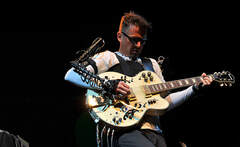
Jonathan Crossley: Immersion in technological improvisatory systems
Great communication is an igniter for the human spirit: when a deeply resonant moment occurs during conversation, we become elated, we feel excited, our spirits are affirmed, we become filled with hope and can often desire ‘remain in that space’. A smoothly flowing conversation constitutes of a series of closely coordinated and predictable actions in which two or more speakers take turns, often within milliseconds (Chapple, 1970). So too is a musical conversation between collaborators. These cognitively resonant moments are not in any way genre-dependent and are equally exciting and equally treasured, no matter the moment, style or setting. As with any dialogue between two or more people, it is not the content (genre) but the experience of cognitive resonance and affirmation during communication that elevates and catapults the shared narrative.
In recent improvisational work I have been exploring and pursuing this through systems that are both responsive and create sonic mirrors, which affirm the performers I am working with. I am aiming to create a fluidity and responsiveness to the improvisers whilst pursuing a sonic immersion during performance. This aims to create an immersive, ephemeral sonic bubble, where often the performers are unsure as to who is in control, often asking ‘who made that sound?’ A world where fragments of the performers’ own sounds, musical lines or words get reconstituted and bled back into the arteries of the greater group for response and reflection: in short, a technologically mediated musical camaraderie.
Northern Irish by birth, South African by life, Crossley is a versatile musician, performer, educator and composer with a specialised interest in contemporary musical cultures and technologies. His musical practice ranges from classical guitar to improvisation, jazz through to electronic music and sonic experimentation.
He has released eight albums, the chamber jazz album ‘My Friends and I’ (2004) to the rock/funk albums ‘Funk for the Shaolin Monk’ (2007) and ‘Got Funk Will Travel’ (2009) the experimental album ‘What if the Machines Spoke Back to You’ (2018), ‘The Settlement’ with Mpho Molikeng (2018), ‘Blipz’ with Reza Khota and Jonno Sweetman (2018) and the EP by his project ‘Deep Spacer’ (2019).
He has relentlessly pursued innovation in not only the use of the guitar and technological systems but in the application of these technologies in recording and looping practices. His PhD research led to the development of an extended guitar system or hyper-instrument, the Cyber-Guitar, which extended the capacities of the traditional electric guitar beyond the use of the hands, encompassing the joints of the upper body through the use of a mechanical exoskeleton. (Concert performances can be viewed on You Tube).
He is currently working on a collaborative projective with visual experimenters ‘Dryfsand’ fusing visual narratives and improvisations with the closed electronic ecology of Deep Spacer.
You can find all of his music on all streaming services, from Spotify to Apple Music and You Tube
Great communication is an igniter for the human spirit: when a deeply resonant moment occurs during conversation, we become elated, we feel excited, our spirits are affirmed, we become filled with hope and can often desire ‘remain in that space’. A smoothly flowing conversation constitutes of a series of closely coordinated and predictable actions in which two or more speakers take turns, often within milliseconds (Chapple, 1970). So too is a musical conversation between collaborators. These cognitively resonant moments are not in any way genre-dependent and are equally exciting and equally treasured, no matter the moment, style or setting. As with any dialogue between two or more people, it is not the content (genre) but the experience of cognitive resonance and affirmation during communication that elevates and catapults the shared narrative.
In recent improvisational work I have been exploring and pursuing this through systems that are both responsive and create sonic mirrors, which affirm the performers I am working with. I am aiming to create a fluidity and responsiveness to the improvisers whilst pursuing a sonic immersion during performance. This aims to create an immersive, ephemeral sonic bubble, where often the performers are unsure as to who is in control, often asking ‘who made that sound?’ A world where fragments of the performers’ own sounds, musical lines or words get reconstituted and bled back into the arteries of the greater group for response and reflection: in short, a technologically mediated musical camaraderie.
Northern Irish by birth, South African by life, Crossley is a versatile musician, performer, educator and composer with a specialised interest in contemporary musical cultures and technologies. His musical practice ranges from classical guitar to improvisation, jazz through to electronic music and sonic experimentation.
He has released eight albums, the chamber jazz album ‘My Friends and I’ (2004) to the rock/funk albums ‘Funk for the Shaolin Monk’ (2007) and ‘Got Funk Will Travel’ (2009) the experimental album ‘What if the Machines Spoke Back to You’ (2018), ‘The Settlement’ with Mpho Molikeng (2018), ‘Blipz’ with Reza Khota and Jonno Sweetman (2018) and the EP by his project ‘Deep Spacer’ (2019).
He has relentlessly pursued innovation in not only the use of the guitar and technological systems but in the application of these technologies in recording and looping practices. His PhD research led to the development of an extended guitar system or hyper-instrument, the Cyber-Guitar, which extended the capacities of the traditional electric guitar beyond the use of the hands, encompassing the joints of the upper body through the use of a mechanical exoskeleton. (Concert performances can be viewed on You Tube).
He is currently working on a collaborative projective with visual experimenters ‘Dryfsand’ fusing visual narratives and improvisations with the closed electronic ecology of Deep Spacer.
You can find all of his music on all streaming services, from Spotify to Apple Music and You Tube
Composition panel: Composition as performance: Performance as composition
Panelists: Sazi Dlamini, Cara Stacey, Afrika Mkhize
Discussant: Thomas Pooley
What constitutes composition? This panel focuses on the ways in which South African performers and composers are engaging with the ‘liveness’ of composition. Perspectives from jazz, indigenous, and art musics offer ways to rethink the boundaries between disciplines, and what it means to compose music for the concert stage.
Sunday morning
Visit to Dr Philip Tabane Foundation and performance at The Village Mamelodi, 3773 Sibande Avenue, Mamelodi, JB3, Mamelodi, 0101 (Twitter: @VillageMamelodi)
Composers’ concert (Sunday 3 pm)
Panelists: Sazi Dlamini, Cara Stacey, Afrika Mkhize
Discussant: Thomas Pooley
What constitutes composition? This panel focuses on the ways in which South African performers and composers are engaging with the ‘liveness’ of composition. Perspectives from jazz, indigenous, and art musics offer ways to rethink the boundaries between disciplines, and what it means to compose music for the concert stage.
Sunday morning
Visit to Dr Philip Tabane Foundation and performance at The Village Mamelodi, 3773 Sibande Avenue, Mamelodi, JB3, Mamelodi, 0101 (Twitter: @VillageMamelodi)
Composers’ concert (Sunday 3 pm)
A note from the chair of NewMusicSA
As the chairman of the board of NewMusicSA I take great pleasure in welcoming you to this year’s NewMusicSA Indaba.
Thanks to the curatorship of Prof. Marc Duby, ably assisted by Lukas Ligeti and Ignacio Priego, this year’s festival theme is “a festival of making”, which is indeed an appropriate way to describe what new music is all about. Whether it is engaging with others in an improvisation, sharing a newly composed work or exploring unfamiliar soundworlds in a constructive collaboration, we are always involved in some process of making new things based on things that have inspired us in order to inspire others.
I also wish to express my gratitude to all who have made this event possible. Our generous sponsors include our long-term partners SAMRO Foundation and Business Arts South Africa. The Malta Arts Fund of the Malta Arts Council has made the international cooperation that is so important to us as members of the International Society of Contemporary Music (ISCM) a possibility through their assistance to our international guest performers Luc Houtkamp and Edwin Balzan. Aside from making facilities available as the one of the main venues for the event, UNISA has also generously assisted us directly, support for which we are immensely thankful. A big thanks also goes out to Thabang Thabane, who has made it possible for us to extend our festival to residents of Mamelodi.
A special thanks must go to the performers who have undertaken to bring to life the new, exciting and interesting music that will enrich us during the festival. Our heartfelt gratitude also goes to the composers who have made the fruits of their labours available to us for our enrichment. Finally, I must thank you, the listener. Thank you being here and thank you for your support. We trust receiving the gifts on offer is as rewarding as it has been to make them.
Douglas Scott
Chairman - NewMusicSA
Thanks to the curatorship of Prof. Marc Duby, ably assisted by Lukas Ligeti and Ignacio Priego, this year’s festival theme is “a festival of making”, which is indeed an appropriate way to describe what new music is all about. Whether it is engaging with others in an improvisation, sharing a newly composed work or exploring unfamiliar soundworlds in a constructive collaboration, we are always involved in some process of making new things based on things that have inspired us in order to inspire others.
I also wish to express my gratitude to all who have made this event possible. Our generous sponsors include our long-term partners SAMRO Foundation and Business Arts South Africa. The Malta Arts Fund of the Malta Arts Council has made the international cooperation that is so important to us as members of the International Society of Contemporary Music (ISCM) a possibility through their assistance to our international guest performers Luc Houtkamp and Edwin Balzan. Aside from making facilities available as the one of the main venues for the event, UNISA has also generously assisted us directly, support for which we are immensely thankful. A big thanks also goes out to Thabang Thabane, who has made it possible for us to extend our festival to residents of Mamelodi.
A special thanks must go to the performers who have undertaken to bring to life the new, exciting and interesting music that will enrich us during the festival. Our heartfelt gratitude also goes to the composers who have made the fruits of their labours available to us for our enrichment. Finally, I must thank you, the listener. Thank you being here and thank you for your support. We trust receiving the gifts on offer is as rewarding as it has been to make them.
Douglas Scott
Chairman - NewMusicSA

